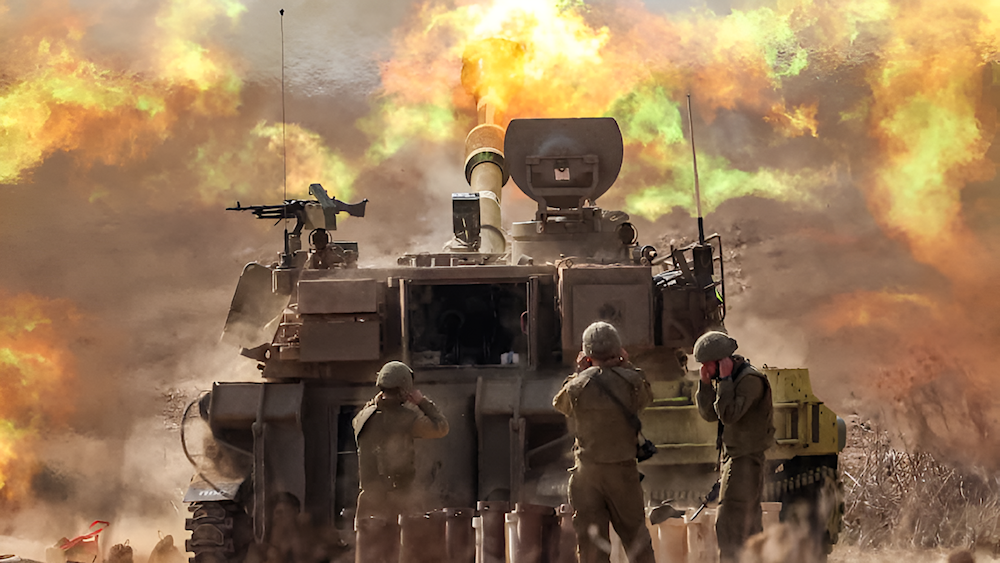'Israel' to occupy Philadelphi Axis, continue Gaza war till year end
The Israeli prime minister's senior security aid says the genocidal war on the Strip is expected to last seven more months.
-

Israeli occupation soldiers fire a self-propelled howitzer toward areas in north Gaza on October 11, 2023. (AFP)
The war on Gaza is expected to continue throughout 2024 at least, Tzachi Hanegbi, the "National Security Advisor" to Prime Minister Benjamin Netanyahu told Israeli Kan public radio.
"The fighting in Gaza will continue for at least another seven months,” he explained.
The Israeli occupation army launched an invasion of densely populated Rafah earlier this month, which coincided with the shutting down of the only two crossings delivering aid to southern Gaza; the Rafah and Karem Abu Salem crossings.
According to Netanyahu and top Israeli military officials, taking control of Rafah is essential to secure "absolute victory" in the genocidal war no nearing its eighth-month mark.
Hanegbi said that the long period of the war seeks to "fortify our achievement and what we define as the destruction of the governmental and military capabilities of Hamas and [Palestinian] Islamic Jihad."
Read more: Israeli operation in Rafah 'hoax': Ex-IOF Operations Division Chief
During the first wave of the invasion, Israeli forces occupied the Rafah crossing after destroying its facilities.
Occupation forces later advanced along the Philadelphi Corridor, the border separating Egypt from southern Gaza spanning around 13 kilometers, claiming that the aim is to close all means of the Resistance to receive weapons via tunnels.
"Inside Gaza, the IDF is now in control of 75% (9 km) of the Philadelphi Corridor and I believe it will be in control of it all with time,” the prime minister's top aid said, adding that the plan is to work with Egypt to “ensure weapon smuggling is prevented."
Cairo on its part denied that arms are being delivered from its side to Gaza.
Nowhere is safe
Rafah witnessed in the past 10 days the most violent Israeli bombardment since the war began.
The occupation committed a number of massacres against families residing in the small city, most notably the killing of over 40 Palestinians in a bombing of a tent city in al-Mawasi sheltering thousands of forcibly displaced Palestinians. The occupation army has forced Palestinians fleeing Rafah to move to al-Mawasi, claiming it was a "safe zone". Most of the massacre's martyrs were women and children.
Footage of the massacre showing slaughtered children and incinerated bodies sparked global outrage, leading to wide condemnation of the Israeli crime, including from the entity's closest allies.
The invasion expanded, reaching Rafah City, with tanks entering crowded residential neighborhoods and streets coupled with intense airstrikes and shelling.
Read more: US, UK doctors relay Israeli atrocities in Gaza to Washington
Around one million Palestinians have had to flee Rafah in the past three weeks, the United Nations Palestinian Refugee Agency (UNRWA) said earlier this week. The international humanitarian organization stressed that the displacement from Rafah "happened with nowhere safe to go and amidst bombardments, lack of food and water, piles of waste and unsuitable living conditions."
'One barely functional hospital'
On Monday, Rafah’s Kuwait Speciality Hospital was forced to shut down its operations after an Israeli strike just outside its gates killed two of its medical staff.
Dr. Suhaib al-Hams, the hospital's director, said it suspended its operations due to the “Israeli occupation forces’ expansion of their military operation in Rafah and their repeated and deliberate attacks on the hospital and its vicinity”.
Additionally, the Palestinian Health Ministry in Gaza stated on Tuesday that six hospitals and medical facilities in Rafah were forced out of service. In addition the the Kuwaiti hospital, the ministry named the al-Najjar hospital (Rafah's largest hospital), the two city's field hospitals, the Indonesian field hospital, and the Abu al-Walid Central Clinic.
Read more: Gaza hospitals running out of fuel due to Rafah invasion: UN agencies
Talking to Reuters and AFP earlier this week, the World Health Organization WHO representative for Gaza and the West Bank said, "If the [Israeli] incursion would continue, we would lose that last hospital in Rafah," Dr Rik Peeperkorn said.

 4 Min Read
4 Min Read










